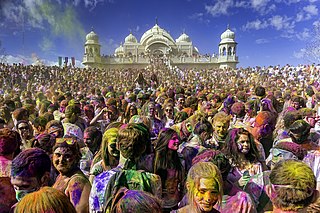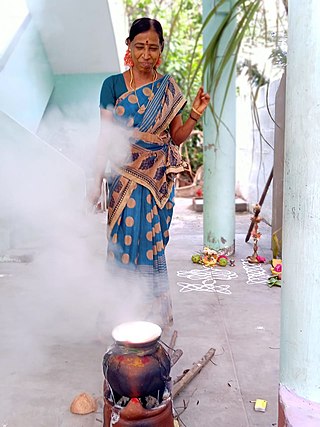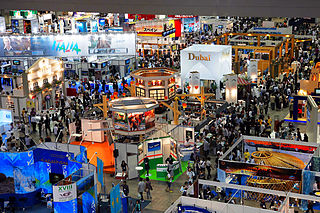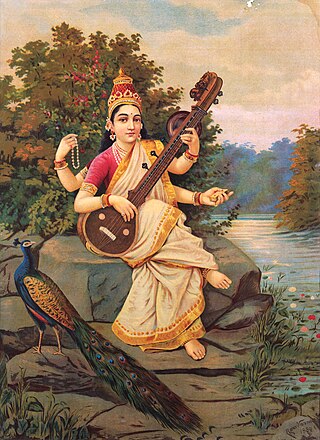
A festival is an event celebrated by a community and centering on some characteristic aspect or aspects of that community and its religion or cultures. It is often marked as a local or national holiday, mela, or eid. A festival constitutes typical cases of glocalization, as well as the high culture-low culture interrelationship. Next to religion and folklore, a significant origin is agricultural. Food is such a vital resource that many festivals are associated with harvest time. Religious commemoration and thanksgiving for good harvests are blended in events that take place in autumn, such as Halloween in the northern hemisphere and Easter in the southern.

A religious festival is a time of special importance marked by adherents to that religion. Religious festivals are commonly celebrated on recurring cycles in a calendar year or lunar calendar. The science of religious rites and festivals is known as heortology.

Diwali is the Hindu festival of lights, with variations celebrated in other Indian religions. It symbolises the spiritual "victory of light over darkness, good over evil, and knowledge over ignorance". Diwali is celebrated during the Hindu lunisolar months of Ashvin and Kartika—between around mid-September and mid-November. The celebrations generally last five or six days.

Pongal, also referred to as Thai Pongal, is a multi-day Hindu harvest festival celebrated by Tamils. It is observed in the month of Thai according to the Tamil solar calendar and usually falls on 14 or 15 January. It is dedicated to Surya and corresponds to Makar Sankranti, the Hindu observance celebrated under many regional names throughout the Indian subcontinent. The festival is celebrated over three or four days with Bhogi, Surya Pongal, Mattu Pongal and Kanum Pongal, observed on consecutive days.

Vijayadashami, more commonly known as Dussehra, and also known as Dasara or Dashain, is a major Hindu festival celebrated every year at the end of Durga Puja and Navaratri. It is observed on the tenth day of the month of Ashvin, the seventh in the Hindu lunisolar calendar. The festival typically falls in the Gregorian calendar months of September and October.

Makar(a) Sankranti, also referred to as Uttarayana, Makar, or simply Sankranti, is a Hindu observance and a festival. Usually falling on the date of 14 January annually, this occasion marks the transition of the sun from the zodiac of Sagittarius (dhanu) to Capricorn (makara). Since the sun has made this transition which vaguely coincides with moving from south to north, the festival is dedicated to the solar deity, Surya, and is observed to mark a new beginning. Many native multi-day festivals are organised on this occasion all over India.

Holi is a popular and significant Hindu festival celebrated as the Festival of Colours, Love, and Spring. It celebrates the eternal and divine love of the deities Radha and Krishna. Additionally, the day signifies the triumph of good over evil, as it commemorates the victory of Vishnu as Narasimha over Hiranyakashipu. Holi originated and is predominantly celebrated in the Indian subcontinent of India and Nepal, but has also spread to other regions of Asia and parts of the Western world through the Indian diaspora.

A fair is a gathering of people for a variety of entertainment or commercial activities. Fairs are typically temporary with scheduled times lasting from an afternoon to several weeks. Fairs showcase a wide range of goods, products, and services, and often include competitions, exhibitions, and educational activities. Fairs can be thematic, focusing on specific industries or interests.

Pohela Boishakh is the first day of the Bengali calendar which is also the official calendar of Bangladesh. This festival is celebrated on 14 April in Bangladesh and 15 April in the Indian states of West Bengal, Tripura, Jharkhand and Assam by Bengalis regardless of religious faith.

Vaisakhi, also pronounced Baisakhi marks the first day of the month of Vaisakh and is traditionally celebrated annually on 13 April and sometimes 14 April. It is seen as a spring harvest celebration primarily in Punjab and Northern India. Further, other Indian cultures and diaspora celebrate this festival too. Whilst it is culturally significant as a festival of harvest, in many parts of India, Vaisakhi is also the date for the Indian Solar New Year.

Buddha's Birthday or Buddha Day is a primarily Buddhist festival that is celebrated in most of South, Southeast and East Asia, commemorating the birth of the prince Siddhartha Gautama, who became the Gautama Buddha and founded Buddhism. According to Buddhist tradition and archaeologists, Gautama Buddha, c. 563-483 BCE, was born at Lumbini in Nepal. Buddha's mother was Queen Maya Devi, who delivered the Buddha while undertaking a journey to her native home, and his father was King Śuddhodana. The Mayadevi Temple, its gardens, and an Ashoka Pillar dating from 249 BCE mark the Buddha's birth place at Lumbini.

The culture of Bangladesh is intertwined with the culture of the Bengal region of the Indian subcontinent. It has evolved over the centuries and encompasses the cultural diversity of several social groups of Bangladesh. The Bengal Renaissance of the 18th early 19th centuries, noted Bengali writers, saints, authors, scientists, researchers, thinkers, music composers, painters, film-makers have played a significant role in the development of Bengali culture. The culture of Bangladesh is deeply intertwined with the culture of the Bengal region. Basically Bengali culture refers to the culture of Bangladesh. The Bengal Renaissance contained the seeds of a nascent political Indian nationalism which was the precursor in many ways to modern Indian artistic cultural expression.

Puthandu, also known as Tamil New Year, is the first day of year on the Tamil calendar and traditionally celebrated as a festival by Tamil People across the world.The festival date is set with the solar cycle of the solar Hindu calendar, as the first day of the Tamil month Chithirai. It falls on or about 14 April every year on the Gregorian calendar. The same day is observed elsewhere in South and South East Asia as the traditional new year, but is known by other names such as Vishu in Kerala, and Vaisakhi or Baisakhi in central and northern India.

Vasant Panchami, also rendered Vasanta Panchami and Saraswati Puja in honour of the Hindu goddess Saraswati, is a festival that marks the preparation for the arrival of spring. The festival is celebrated in Indian religions in different ways depending on the region. Vasant Panchami also marks the start of preparation for Holika and Holi, which take place forty days later. The Vasant Utsava (festival) on Panchami is celebrated forty days before spring, because any season's transition period is 40 days, and after that, the season comes into full bloom.

Thanksgiving is a national holiday celebrated on various dates in October and November in the United States, Canada, Saint Lucia, Liberia, and unofficially in countries like Brazil, Germany and the Philippines. It is also observed in the Dutch town of Leiden and the Australian territory of Norfolk Island. It began as a day of giving thanks for the blessings of the harvest and of the preceding year. Various similarly named harvest festival holidays occur throughout the world during autumn. Although Thanksgiving has historical roots in religious and cultural traditions, it has long been celebrated as a secular holiday as well.
The following outline is provided as an overview of and topical guide to festivals:
Punjabi festivals are various festive celebrations observed by Punjabis in Pakistan, India and the diaspora Punjabi community found worldwide. The Punjabis are a diverse group of people from different religious background that affects the festivals they observe. According to a 2007 estimate, the total population of Punjabi Muslims is about 90 million, with 97% of Punjabis who live in Pakistan following Islam, in contrast to the remaining 30 million Punjabi Sikhs and Punjabi Hindus who predominantly live in India.

Vasanta, also referred to as Basant, refers to the Indian spring.
Here is a list of glossary of Culture of India in alphabetical order:

















